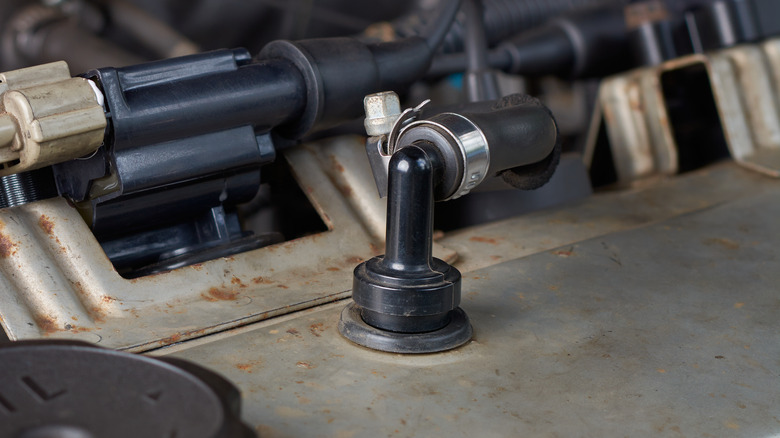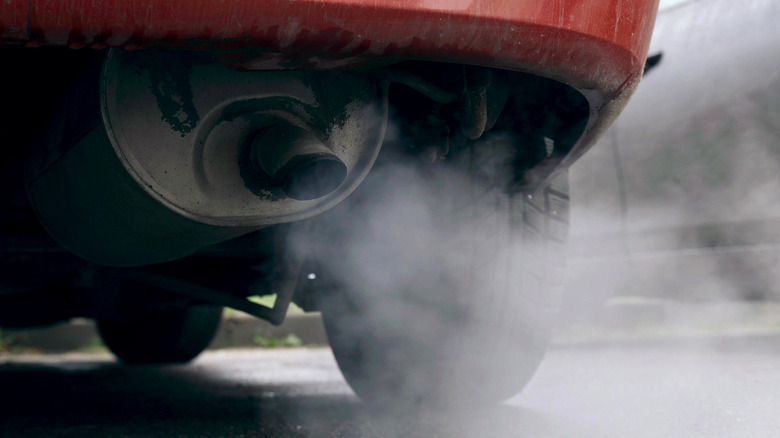
Changing an air filter is usually considered routine maintenance -- well, except for Ford's "lifetime" air filters -- and you can find all kinds of dirt and debris stuck to your old filter before you toss
it. But one of the things you really don't want to see on that filter is oil. Unless you've been driving on one of those planets where hydrocarbons rain from the sky, the most likely way for oil to find its way into your air filter is from your own car.
The issue is that other car components somewhere down the line aren't doing their job, so oil is ending up where it shouldn't. In most cases of oil being in the air filter, there's an issue with a valve in the crankcase. Then you end up with too much oil on the filter, which can clog the microscopic holes that let air through, leading to combustion problems.
Remember, a car's motor makes power by burning fuel, and fuel won't burn without oxygen, and an engine that's being suffocated by a lack of oxygen will have serious problems with efficiency and performance. Of course, that may be one of the least of your concerns if there's oil in your air filter.
Read more: These Are The Worst Transmission Recalls Of The Last 5 Years
A Cranky Crankcase Is A Top Cause Of Oil In Your Air Filter

The most common culprit in the case of oil in your engine's air filter is a single valve for your crankcase. In the anatomy of the typical car engine, the crankcase is where the up and down movement of the cylinders is transformed, via the crankshaft, into the spinning motion needed to drive the wheels. To help matters, the crankcase is usually located beneath the cylinder banks, although the flat boxer engines still used by Subaru are an exception.
Anyways, all that piston movement and crankshaft spinning requires a fair amount of lubrication for smooth running, so there's a lot of oil flowing through your engine. Without getting too far into the details, the oil moves through the system under pressure, and engines have what's known as a positive crankcase ventilation (PCV) valve to let off some of the pressure if necessary.
Now imagine so much pressure builds up that the PCV valve is overwhelmed and starts letting oil by. Well, the whole system is set up so the PCV bleeds the excess back into the air intake system, so the oil can eventually work its way back to your engine air filter.
Problems With The PCV Valve

A few different things can make trouble for a PCV, including bad piston rings. They're supposed to make a seal between the piston and cylinder wall, but it's not perfect, and some extra oil can get past to cause what's known as blow-by, which is totally normal in small amounts and usually dealt with by the PCV system. If the rings are damaged or worn, too much oil gets through only to end up shunted back into the intake system and, eventually, to the engine air filter.
It's also worth remembering that oil flows throughout your engine to keep many other parts lubricated as well, and if these channels get clogged by sludge, it will restrict the flow of oil. With nowhere to go, the oil pressure builds up and, again, you can end up with oil forced past the valve. Needless to say, you're in the same trouble if the PCV valve itself malfunctions. Keep an eye out for blue-white smoke from your exhaust, as bad PCV valves are a likely cause if your car's burning oil.
One final reason for finding oil in your engine air filter: It's supposed to be there for certain high-performance air filters. They have larger -- but still microscopic -- holes to let more air through, and they rely on the oil to catch the small particles of dirt and debris that may be sucked into the intake.
Want more like this? Join the Jalopnik newsletter to get the latest auto news sent straight to your inbox...
Read the original article on Jalopnik.












